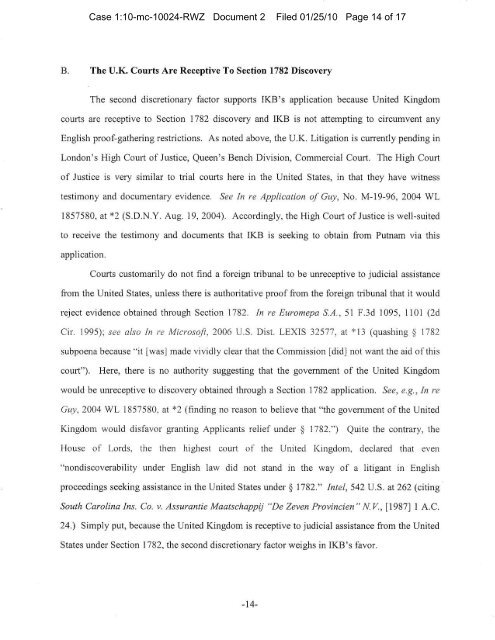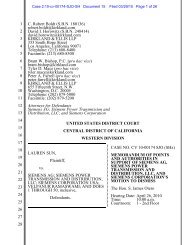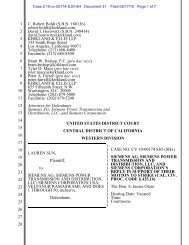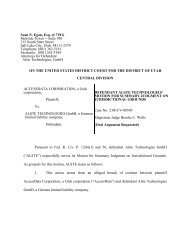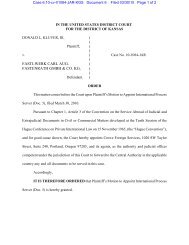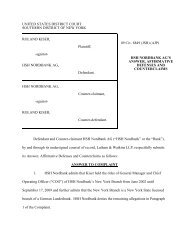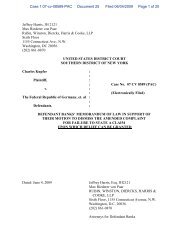IKB Memo ito support the Order
IKB Memo ito support the Order
IKB Memo ito support the Order
Create successful ePaper yourself
Turn your PDF publications into a flip-book with our unique Google optimized e-Paper software.
Case 1:10-mc-10024-RWZ Document 2 Filed 01/25/10 Page 14 of 17<br />
B. The U.K. Courts Are Receptive To Section 1782 Discovery<br />
The second discretionary factor <strong>support</strong>s <strong>IKB</strong>'s application because United Kingdom<br />
courts are receptive to Section 1782 discovery and <strong>IKB</strong> is not attempting to circumvent any<br />
English proof-ga<strong>the</strong>ring restrictions. As noted above, <strong>the</strong> U.K. Litigation is currently pending in<br />
London's High Court of Justice, Queen's Bench Division, Commercial Court. The High Court<br />
of Justice is very similar to trial courts here in <strong>the</strong> United States, in that <strong>the</strong>y have witness<br />
testimony and documentary evidence. See In re Application of Guy, No. M-19-96, 2004 WL<br />
1857580, at "2 (S.D.N.Y. Aug. 19, 2004). Accordingly, <strong>the</strong> High Court of Justice is well-suited<br />
to receive <strong>the</strong> testimony and documents that <strong>IKB</strong> is seeking to obtain from Putnam via this<br />
application.<br />
Courts customarily do not find a foreign tribunal to be unreceptive to judicial assistance<br />
from <strong>the</strong> United States, unless <strong>the</strong>re is authoritative proof from <strong>the</strong> foreign tribunal that it would<br />
reject evidence obtained through Section 1782. In re Euromepa S.A., 51 F.3d 1095, 1101 (2d<br />
Cir. 1995); see also In re Microsoft, 2006 U.S. Dist. LEXIS 32577, at *:I3 (quashing $ 1782<br />
subpoena because "it [was] made vividly clear that <strong>the</strong> Commission [did] not want <strong>the</strong> aid of this<br />
court").<br />
Here, <strong>the</strong>re is no authority suggesting that <strong>the</strong> government of <strong>the</strong> United Kingdom<br />
would be unreceptive to discovery obtained through a Section 1782 application. See, e.g., Irz re<br />
GLI~, 2004 WL 1857580, at *2 (finding no reason to believe that "<strong>the</strong> government of <strong>the</strong> United<br />
Kingdom would disfavor granting Applicants relief under S 1782.")<br />
Quite <strong>the</strong> contrary, <strong>the</strong><br />
House of Lords, <strong>the</strong> <strong>the</strong>n highest court of <strong>the</strong> United ICingdom, declared that even<br />
"nondiscoverability under English law did not stand in <strong>the</strong> way of a litigant in English<br />
proceedings seeking assistance in <strong>the</strong> United States under 5 1782." Intel, 542 U.S. at 262 (citing<br />
South Carolina Ins. Co. v. Assurantie Maatschappij "De Zeven Provincien " N. V., [I9871 1 A.C.<br />
24.) Simply put, because <strong>the</strong> United Kingdom is receptive to judicial assistance from <strong>the</strong> United<br />
States under Section 1782, <strong>the</strong> second discretionary factor weighs in <strong>IKB</strong>'s favor.


